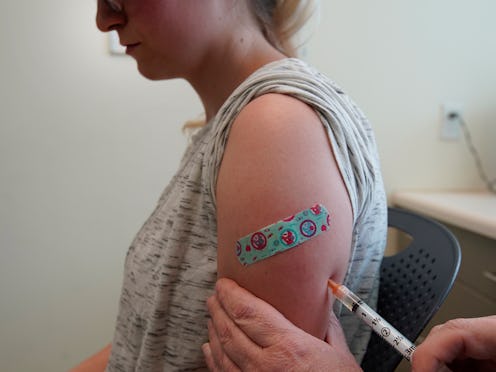Life

After being declared eradicated in the U.S. in 2000, a measles outbreak has infected over 750 people with the disease in 2019, according to the CDC. Most people will be inoculated against the virus thanks to the measles, mumps, and rubella (MMR) vaccine, which is typically administered in childhood, but the current outbreak is believed to have originated with undervaccinated or nonvaccinated communities. And this lack of herd immunity — when enough people are vaccinated against a disease that it's prevented from spreading — puts these groups of people most at risk for measles: young children, unvaccinated travelers, pregnant people, and immunocompromised folks.
Measles is very contagious, and it can be dangerous. "Any droplets or airborne exposure to someone with the first symptoms of measles can lead to an infection in the non-immune (non-vaccinated) person. This can happen even up to two hours after the patient with measles has left the same room," Dr. Julie E. Mangino MD, FSHEA, FIDSA, Professor Emeritus at the Ohio State University Department of Internal Medicine, tells Bustle. "About one in four cases with measles will require hospitalization and up to one in three cases can experience one or more complications," Dr. Mangino says, including diarrhea, pneumonia, encephalitis, or for pregnant people, premature labor, low birth weight, or miscarriage.
If you or someone you love is at risk of contracting measles, practice good hygiene and stay home if you think you might be exposed to measles in your community.
1
Very Young Children
"Those at highest risk include infants and children less than 5 years of age (as they have not yet received two doses of MMR)," Dr. Mangino tells Bustle. Very young children can't be vaccinated until they're about 12 to 15 months old, according to guidelines from the CDC, and won't receive their second booster dose until they're over 4 years old.
"Approximately 110,000 people died from measles in 2017 — mostly children under the age of 5 years," the World Health Organization said in 2018. Until they have their second MMR shot in early childhood, children are vulnerable to measles infection.
2
Unvaccinated People Who've Travelled To Measles-Infected Areas
Measles cases are rising in European countries as well as in the U.S., and "have also been linked to music festivals and other large public events," according to the University of Oxford's Vaccination Safety Project. They note that people who are traveling to big festivals or crowded places are highly recommended to check their immunization history before they go.
The consequences of this have shown up starkly in the U.S., where Vox reports that unvaccinated travelers from Israel, which is currently having a measles outbreak, brought the illness back and exposed it to unvaccinated people in New York, while a spike in measles cases in Washington was also traced to a traveler who had recently returned from Eastern Europe.
The CDC advises that "people 6 months of age or older who will be traveling internationally should be protected against measles." They specify that children over 12 months should have two MMR doses, and anybody born after 1957 should have documentation that they've either had measles and are now immune to it, or have had both their MMR vaccines. Even if there's no evidence of any measles in the places you're going, if it's a crowded festival, city, or event, you'll want to make sure you have all your vaccinations — so you don't carry measles back to infect others.
3
Pregnant Women
"Those who are pregnant" are also of "highest risk," Dr. Mangino says. People who are pregnant and had their MMR vaccine as a child are effectively immune for life, but the MMR vaccine isn't considered safe to administer to pregnant people, so unvaccinated pregnant people, or people who've only had one of their two doses, are considered high-risk for measles infections. People who haven't been vaccinated against measles and contract it during pregnancy have a higher risk of stillbirth, miscarriage, premature birth and giving birth to babies with low birth weight, explains the National Health Service.
4
Immunocompromised People
"Those people who are immunocompromised due to cancer or AIDS or medical treatments are at risk for severe measles with complications and death due to their weakened immune system," Dr. Mangino says. "The antibodies they had from their vaccine no longer work." Almost 3% of the U.S. population may be currently immunocompromised, according to data from 2016, and that includes children. Vaccines rely on a properly functioning immune system to provide protection, so even if they've had the vaccines before, the damage to their immune systems means they're no longer effectively protected against measles.
5
If you're not sure about your immunization history or think you never had a vaccine against measles, now is the time to go see your GP, request your records from your pediatrician, and get the shot. For people who are unable to get the vaccine, it's imperative that close friends and family do.
This article was originally published on